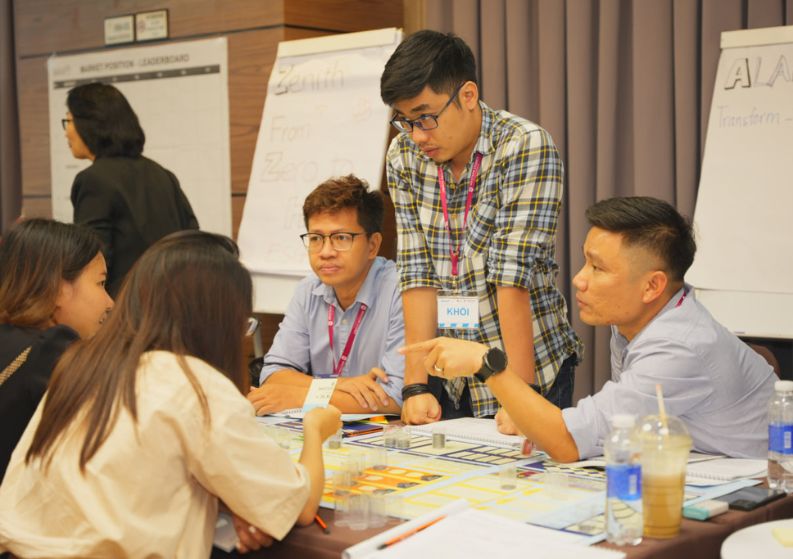Project Manager at CapitaLand Development (Vietnam): ‘MBA is an ideal environment for self-improvement’
“If you aim to become a manager in the future, an MBA will be one of the ideal environments to help you accumulate and upgrade new skills” – said Mr. Tran Tuan Nghia, Project Manager at CapitaLand Development (Vietnam) and a 2022 cohort MBA student at Western Sydney University.

Mục lục
- Firstly, Mr. Nghia, could you please introduce your current role at CapitaLand Development (Vietnam)?
- How do you manage your team?
- Throughout years of team management, do you feel that ‘Ability’ or ‘Skill’ is more important in the context of leading a team?
- It’s known that Mr. Nghia is currently an MBA student at Western Sydney University. Could you share the similarities and differences between the work environment and the MBA program?
- Finally, could you share some advice for young individuals aspiring to become managers in the future?
- Thank you for your insightful and interesting sharing, Mr. Nghia. Wishing you good health and success in your career!
Firstly, Mr. Nghia, could you please introduce your current role at CapitaLand Development (Vietnam)?
As a Project Manager at CapitaLand Development (Vietnam), I oversee residential and commercial construction projects. After obtaining the building permit, the team proceeds with on-site construction until completion and handover to the buyer. My role revolves around managing progress, quality, costs, and collaboration with internal departments within the company, contractors, consultants, as well as administrative bodies. Overall, my work contributes to completing a project as part of the bigger picture.

How do you manage your team?
Firstly, the manager needs to clarify the KPIs (Key Performance Indicators) for each individual, helping them understand their role in guiding the project towards its goals and ensuring quality. Establishing clear roles from the outset helps team members understand their tasks, avoiding conflicts during work.
Moreover, ‘bonding’ within the team is crucial for more effective collaboration. For instance, team bonding doesn’t necessarily have to be formal; it could involve lunch, coffee breaks, or sports activities like soccer. Such relaxed environments can foster stronger connections among team members, leading to smoother workflows as people understand and empathize with each other’s challenges.

Throughout years of team management, do you feel that ‘Ability’ or ‘Skill’ is more important in the context of leading a team?
In my opinion, someone considered for a leadership role already possesses certain ‘abilities.’ In situations requiring interaction and coordination among various parties, such as the daily tasks of a project manager, I believe ‘skills’ become crucial. Especially in situations necessitating alignment among involved parties like internal teams, regulatory bodies, and governmental agencies, ‘skills’ play a decisive role. This contributes to achieving shared objectives.
Therefore, when considering the importance of ‘ability’ versus ‘skill,’ I believe in scenarios involving resolving conflicts among multiple parties, ‘skills’ add more value in achieving the initial objectives.

Similarly to the work environment, MBA studies follow similar principles. Essentially, all members need to contribute to the project within specific timelines for each task.
Additionally, team members will have distinct strengths and weaknesses, hence mutual support to achieve the best results is essential. For example, within a team, if some members excel in technical aspects, they can support others. Conversely, if they lack knowledge in sales, marketing, or finance, other team members proficient in these areas can offer assistance. Thus, the principle remains akin to the work environment.
The difference lies in MBA coursework occurring within a short timeframe. Since team members might not know each other well, additional time is required for teamwork. However, as members begin to understand each other and their professional domains better, the team achieves higher efficiency.

If you’re aspiring to become a manager in the future, it might be essential to consider the following points. Firstly, set clear and defined goals. Secondly, equip yourself with specific knowledge and skills to elevate your capabilities to new heights. The MBA environment is also a place where you gradually accumulate new skills to enhance yourself and tackle work challenges. Here, you’ll meet individuals—colleagues or seniors—with expertise from different professional backgrounds. It’s a fantastic opportunity. Lastly, maintain good physical and mental health to always be ready to challenge yourself with new opportunities.
Thank you for your insightful and interesting sharing, Mr. Nghia. Wishing you good health and success in your career!
MBA Meetup is a series of online networking events focusing on educational journeys, learning experiences, and work insights shared by current and former MBA students.
More events: From the MBA program at Western Sydney University
